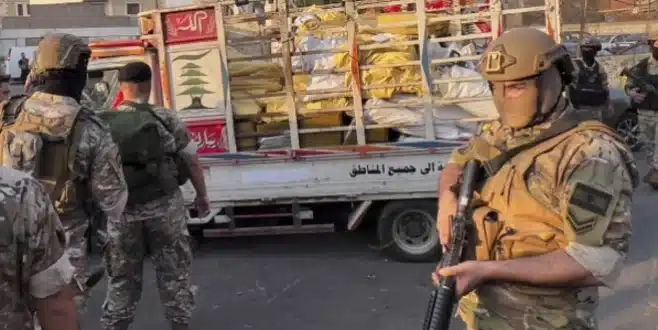Palestinian groups in several Beirut refugee camps have formally handed over stockpiles of weapons to the Lebanese Army, marking a significant step in the government’s broader effort to disarm non-state actors across the country. The move underscores Lebanon’s attempt to consolidate security authority amid heightened regional tensions and international pressure.
Details of the Weapons Transfer
According to Ramez Dimashkieh, head of the Lebanese-Palestinian Dialogue Committee, the Palestine Liberation Organization (PLO) delivered three truckloads of heavy weaponry, including rockets, from multiple camps across the capital. One truck came from the Mar Elias and Shatila camps, while two others were collected from Burj al-Barajneh camp and its surrounding neighborhoods.
“This completes the process of handing over PLO weapons from Beirut camps,” Dimashkieh told AFP. Soldiers were seen inspecting large wooden crates of arms at the entrance to Burj al-Barajneh before loading them into army vehicles. Witnesses described heavy troop deployments around the site during the operation, underscoring the sensitivity of the moment.
The National News Agency also confirmed that armored army units had entered Burj al-Barajneh earlier in the day “to receive a new batch of Palestinian weapons.”
Agreement Between Abbas and Aoun
The disarmament process stems from a deal reached in May between Palestinian President Mahmoud Abbas and Lebanese President Joseph Aoun. Both leaders agreed that Palestinian factions would gradually surrender their weapons to Lebanese authorities.
The initiative began last week when Abbas’ Fatah movement handed over heavy weapons from Burj al-Barajneh, one of Beirut’s largest and most heavily armed camps. Fatah, the leading faction of the PLO, remains the dominant Palestinian political and security force in Lebanon.
Other groups, such as Hamas and Islamic Jihad—which maintain close ties with Hezbollah—are not part of the PLO and have yet to participate in the process. Dimashkieh acknowledged this, stating that “there are still other factions that have not surrendered their weapons, but the process has started.”
Expansion to Southern Lebanon
The disarmament effort is not limited to Beirut. On Thursday, PLO factions in southern Lebanon turned over heavy weapons from the Rashidieh, Al-Bass, and Burj al-Shemali camps, according to Dimashkieh’s committee. These camps have historically been flashpoints for armed clashes, both internal and with external actors, making their inclusion in the process a key development.
Link to Hezbollah Disarmament Plan
The handover comes as Lebanon’s cabinet has tasked the army with preparing a comprehensive plan to disarm Hezbollah and other armed groups by the end of the year. The plan, due for presentation to the government by the end of the month, reflects both U.S. pressure and mounting fears of further escalation with Israel.
Since the 14-month war between Israel and Hezbollah that ended in November with a U.S.-brokered ceasefire, Israel has repeatedly called for Hezbollah’s disarmament. Palestinian groups allied to Hezbollah, including Hamas, were also involved in launching rockets toward Israel during that conflict.
Historical Context
For decades, Palestinian camps in Lebanon have operated outside the authority of the Lebanese state. By longstanding convention, the Lebanese Army does not enter these camps, leaving internal security to Palestinian factions themselves. This autonomy has often made the camps centers of armed activity and political tension.
The ongoing weapons handover marks one of the most significant efforts in years to change that dynamic, though questions remain about whether non-PLO groups will comply.
What Comes Next
While Friday’s transfer is an important milestone, the process is far from complete. The Lebanese government views the PLO’s cooperation as a test case for the broader, more contentious issue of Hezbollah’s disarmament. Whether Hamas, Islamic Jihad, and Hezbollah will eventually agree to similar steps remains deeply uncertain.
For now, the Lebanese Army has taken possession of rockets and heavy weaponry once considered untouchable inside Palestinian camps—a development that could signal a shift in the balance of authority between the state and armed non-state groups.


